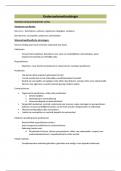What are reservations & declarations and how are they made?
Reservations
The ability to create reservations to treaties is part of the sovereign powers of a state.
The ability of a state to create reservations demonstrates that a state cannot be bound
by something it has not consented to. Reservation is defned in Article 2 of the VCLT.
Reservations are unilateral acts of the state and are therefore a tool of feeibility for state
parties. However, the provisions on treaty reservations are only relevant as to multilateral
treaties, thus States cannot make reservations to bilateral treaties. Should a state
propose a reservation to a bilateral treaty, it is considered merely a proposal for
renegotiations.
A frst question to consider is whether or not a specifc treaty allows for state parties to
make reservations. If the treaty is silent on this matter, then you can turn to the VCLT.
Part 2, Section II of the VCLT contains provisions regarding reservations to (multilateral)
treaties. This provision sets out three possibilities as to whether the treaty in question
allows for state parties to create reservations to it or not Article 19 VCLT.
Sub a. - when reservations are prohibited by the treaty
If the states parties to the treaty agree that no reservations should be made to the treaty,
then they can include a provision prohibiting reservations in the treaty.
E.g. most new multilateral environmental treaties eepressly prohibit reservations. In such treaties, consensus is
deemed fundamental. Moreover, environmental treaties are often based on the Common But Diferentiated
Responsibility Principle (CBDR). This principle allows prohibition of reservations, but still diferentiates between
states' obligations.
Sub b. - when some types of reservations are prohibited by the treaty
States may also agree that certain (specifed) reservations are prohibited or allowed.
E.g. some human rights treaties specifcally allow for a prohibition of reservations to particular provisions. The
nature of international human rights law eeplains the rationale behind such partial prohibitions.
The law of treaties is based on the contractual nature of treaties. However, human rights treaties are not
contractual in nature. In other words, human rights treaties do not only create obligations between states. They
create complee threefold-relationships between states and individuals, involving rights and duties.
On the other hand, it is considered benefcial if as many states as possible accede to a human rights treaty. The
allowance of treaty reservations may function as an incentive for states to accede to human rights treaties.
Sub c. – when the treaty is silent on the matter of reservations
Problems may arise if the treaty remains silent on reservations. Article 19 VCLT provides
guidance. Reservations are allowed in principle, unless sub a or b applies, or unless the
reservation is contrary to the object and purpose of the treaty in question c.
RESERVATIONS TO THE CONVENTION ON THE PREVENTION AND
PUNISHMENT OF THE CRIME OF GENOCIDE, ADVISORY OPINION
This case concerned a reservation made by the United States to Article IX of the
Convention on Genocide. Article IX states that disputes relating to the interpretation,
application or fulflment of the Genocide Convention shall be submitted to the ICJ at the
request of any of the parties to the dispute. The United State's reservation to Article IX
stipulated that the United States could not automatically be subjected to the jurisdiction
of the International Court of Justice.
The US reservation is formulated as follows:
"(1) That with reference to article IX of the Convention, before any dispute to which the United States is a party may be
submitted to the jurisdiction of the International Court of Justice under this article, the specifc consent of the United States is
required in each case.”
The United States made a similar reservation to Article 30 of the Convention Against Torture and Other Cruel, Inhuman
and Degrading Treatment or Punishment. The reservation is formulated as follows:
"(2) That pursuant to Article 30(2) the United States declares that it does not consider itself bound by Article 30(1) but reserves
the right specifcally to agree to follow this or any other procedure for arbitration in a particular case.”
Relevant paragraphs/ pages page 24, 29
A reservation that is incompatible with the object and purpose of a treaty would not be
permissible. It should be noted that, in the Reservations to Genocide Convention case,
the object and purpose of the treaty was clear. However, in other treaties, a single object
and purpose may be more difcult to determine. Therefore, the practical value of the
object and purpose-test remains somewhat vague.
Literature: Chapter 3 – International Law, Part 9 & 22 – E-learning, 1
Cases: 3












